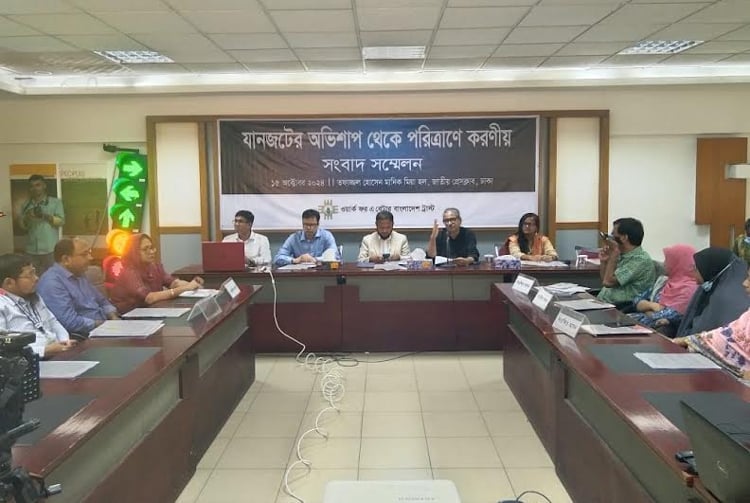
DHAKA, Oct 15, 2024 (BSS) - The Work for a Better Bangladesh Trust today placed an 18-point recommendation to improve the country's traffic system, as about 82 lakh working hours were being wasted daily due to the traffic congestion in Dhaka city.
It said the monetary value of the wasted working hours was about Taka 139 crore daily, which would be more than Taka 50,000 crore annually.
They made this recommendation at a press conference at the National Press Club here, said a press release.
The organization noted that lack of respect and non-compliance of law as well as non-mandatory training of drivers became the key-reason for making Dhaka city's traffic system ineffective.
Alongside the 18-point recommendation, it also advocated for the introduction of automated integrated traffic management system or customizable integrated traffic management system (CITMS) to overcome this situation.
They also expressed hope that the current interim government will play a positive role in developing a multi-media based integrated and people-friendly communication system.
Executive Director of the Work for a Better Bangladesh Trust Saifuddin Ahmed and traffic signal system researcher Ashraful Alam Ratan presented the key-note, while Syeda Ananya Rahman, program head of the organization, conducted it.
Saifuddin Ahmed said that in 2007 the average speed of cars in Dhaka was 21 km per hour, which has now reduced to 4.8 km.
He attributed several factors -undisciplined driving, delay of mega projects on various busy roads, private car dependency, weak traffic signals and monitoring system, mismanagement of vehicle registration, lack of scientific and modern methods in overall traffic management-- responsible for this problem of traffic congestion.
"If these issues are properly resolved, speed and discipline can return to the road," he added.
Ashraful Alam Ratan also found various reasons for the ineffective traffic system of Dhaka city, of which most were hand-stick-based signal system, chaos in the crossing of vehicles at the signal, creating obstacles by parking cars, non-respect and disobey of law and non-mandatory regular driver training etc.
To overcome this situation, he proposed customizable integrated traffic management system or Customizable Integrated Traffic Management System (CITMS).
The speakers said that Dhaka city has become one of the most traffic jam prone cities in the world due to the unplanned urban transport system.
According to a United Nations Development Program report, Bangladesh's population will increase to 23-25 crore by 2050, and a large portion of this population growth will occur in urban areas. If steps are not taken to reduce the traffic congestion now, the situation will become awful, they said.
They also said that they expect the current interim government will play a positive role in building a multi-media integrated and people-friendly communication system by increasing investment in public transport, buses, railways and waterways.
President of Bangladesh Institute of Planners Dr Adil Muhammad Khan, lawyer and policy analyst Syed Mahbubul Alam, technical advisor of Vital Strategies Aminul Islam Sujan, executive member of Center for Urban Studies Maruf Hossain, and general secretary of anti-narcotics organization, Pratyasha, Helal Ahmed also spoke.
Before the press conference, a sit-in programme was held in front of the National Press Club demanding fair traffic management.